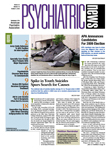Although autism and schizophrenia are now generally recognized as two separate illnesses, there is reason to believe that autistic traits and schizophrenia traits co-occur in some individuals.
For instance, some children with autism disorder have been found to develop schizophrenia later in life, the negative symptoms of schizophrenia have been found to co-vary with autistic traits in certain schizophrenia subjects, and a link between autistic traits and schizophrenia traits was found in a sample of college students.
Now certain individuals with schizotypal personality disorder—considered the mildest schizophrenia-spectrum illness—have been found to possess an unusual preponderance of autistic traits. The results of the study, which was led by Michelle Esterberg, M.P.H., of Emory University, were published in the September Schizophrenia Research.
The study included 121 adolescent subjects—35 with schizotypal personality disorder; 38 with other types of personality disorders (antisocial, avoidant, borderline, narcissistic, obsessive-compulsive, paranoid, or schizoid); and 48 with no personality disorders. The subjects were evaluated for various autistic characteristics, and the results for each group were then compared.
The schizotypal group scored significantly higher than the other two groups on a number of autistic traits. They included being socially anxious, having no close friends, using a limited number of facial expressions, not showing affection, being unaware of social cues, having circumscribed or unusual interests, and being resistant to change. Furthermore, the schizotypal group scored especially high on deficits in the social-functioning domain.
“The present findings indicate significant ... overlap between autism-spectrum and schizophrenia-spectrum disorders,” Esterberg and her colleagues concluded.
Why might autistic traits and schizophrenia traits coexist in certain persons? Esterberg and her group suspect that it is because the autism-spectrum disorders and the schizophrenia-spectrum disorders share some of the same susceptibility genes or because some of the susceptibility genes contributing to each spectrum are occasionally inherited together.
For instance, individuals who lack genes on a particular stretch of chromosome 22—called the 22q11 chromosomal deletion—are known to be at heightened risk for both the autistic-spectrum and schizophrenia-spectrum disorders, they pointed out, suggesting that some genes located in this stretch are complicit in both disorders (Psychiatric News, September 19).
But one point they are quite sure about, as are many other investigators, is that autism and schizophrenia are not identical illnesses. One reason is because 10 of their schizotypal subjects, as well as two other subjects from the “other personality disorder” category, developed schizophrenia during a three-year follow-up period. Yet the researchers could find no link between having autistic traits and subsequently developing schizophrenia.
The study was funded by the National Institute of Mental Health.
An abstract of “Childhood and Current Autistic Features in Adolescents With Schizotypal Personality Disorder” can be accessed at<www.sciencedirect.com> by clicking on “Browse A-Z,” “S,” and then“ Schizophrenia Research.” ▪
